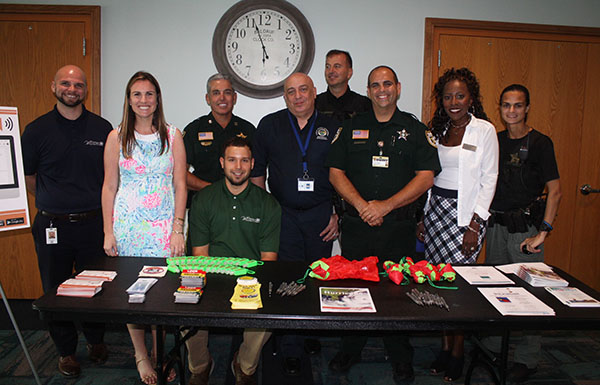
It was a packed house at Wellington’s Village Wide Neighborhood Watch Meeting on Wednesday, May 8 at the Wellington Community Center. The evening featured Palm Beach County’s Department of Public Safety Special Projects Coordinator Michael Jankowski giving a presentation on hurricane preparedness.
Wellington staff members were also on hand to give out brochures and stickers, and to discuss concerns residents might have.
Jankowski explained that his mission is to minimize the impact of emergencies and disasters to the community through education, training and response. “We really enjoy doing public outreach, whether we are going to a local HOA or coming to a town hall meeting like this,” he said. “We love to come out and share our information.”
The county’s Division of Emergency Management needs support from the entire community to keep people safe during hurricane season.
“We cannot just do it ourselves. Emergency management takes a lot of people. It is not just here in Wellington, but Palm Beach County and the State of Florida,” Jankowski explained. “It is our businesses, our churches, our synagogues and organizations. Our first responders are important. We believe that by having partnerships with these organizations and including our citizens, we can be proactive in helping.”
The presentation included educating the audience about storms and being prepared. This means making a plan, building a hurricane kit, getting involved and being informed.
Making a family plan is important. This will determine who does what and where your family will ride out the storm. Having such a plan can help save lives, Jankowski said.
Before a storm arrives, residents should locate their water meter and electrical shutoff. Trim trees and store loose objects. Know the disaster plan at your child’s school or daycare. Install and test smoke detectors. Use a video camera to record the contents of your home and store a copy of the video with a friend who lives out of town. Photocopy important papers and store them safely. Make plans to board your pet if you decide to go to a shelter. Obtain cash or travelers checks and establish an out-of-state contact to call in case of an emergency.
Making a plan has different meanings to different people. “Do you have trees that could come down or branches that could fall on your car? These are things you want to prepare for,” Jankowski said. “Evacuation zones may not affect you, as you are far west off the coast. Only if there are instances that you are in a mobile home park or modular homes that you should evacuate.”
The key is to know what to do before a storm arrives.
“Know where to go and how to get there,” Jankowski continued. “Know where there are shelters, gas stations, grocery stores and resources. Know if you are in a flood zone. Our web site will list what gas stations are open. We will also list what grocery stores are open.”
All this information and more can be found at www.readypbc.com.
“One thing we noticed with Hurricane Irma was there was a massive evacuation,” Jankowski said. “People were outwardly afraid this was going to be a big hurricane, so they left. But what happened was the freeways backed up. People were actually stuck, and they didn’t know what to do and where to go. Don’t wait until the last minute.”
Everyone’s situation and tolerance levels are different, he explained.
“Should you go to a shelter? This depends on your situation. Is your house new, and built solid, or do you live in a mobile home? Let someone know if you go to a shelter. Know where your shelters are. You can find these on our web site,” Jankowski said.
When making your kit, stock up on enough water for three to five days; one gallon per day/per person. Have stored non-perishable foods like soup and canned fruit. Have a first-aid kit. Pack a fire extinguisher. Have on file important documents like birth certificates and insurance information. Make sure to have enough prescription medications stored. Have batteries and flashlights on hand. And in order to hear from the outside world in case cell towers are down and cable channels are out of service, have a NOAA all hazards weather radio with extra batteries.
“We are very active on social media,” he continued. “We are on Facebook at PBCDEM, Twitter @PBCDEM and now Instagram. If you are not already following us, I encourage you to do so.”
The county’s special needs shelter only accepts residents with a physical condition requiring medical or nursing care that cannot be provided for in a general population shelter. Individuals must be able to sleep on a cot or a mat. Pre-registration is required. Call (561) 712-6400 to register before a hurricane hits.
Remember, pets are not allowed in general shelters. If you live in an evacuation zone, pets can be pre-registered for the pet-friendly shelter by calling (561) 233-1266.
According to the Palm Beach County Public Safety Department, disasters can happen without warning and are not just hurricanes. Have disaster supplies on hand year-round.
Knowing where to go and having a specific plan to be safe and comfortable should be on everyone’s mind as this year’s storm season approaches.







